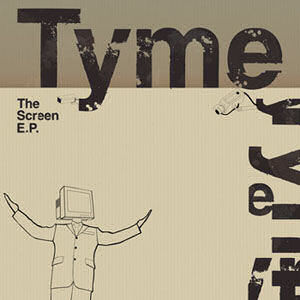The city of Melbourne is well represented on RapReviews.com, and the reputation that precedes its hip-hop scene is that of hard-nosed, hard-working folks who put the needs of hardcore hip-hop heads first. Stylistically Tyme, who also hails from Melbourne, doesn’t follow in the footsteps of Brad Strut, Maundz, Tornts, Pegz, Fluent Form, or Eloquor. He tags his music not only with ‘hip-hop and ‘rap’ but also with ‘jazz’ and plays the sax on his own tracks. And yet he shares a general awareness/anxiety with many of his Australian peers who rap.
He takes the classical route by bringing up two of the 20th century’s most visionary works of literature. “1984 (Interlude)” quotes from George Orwell’s Nineteen Eighty-Four, while “Soma” is inspired by Aldous Huxley’s Brave New World, the song named after the infamous drug that keeps the subjects seemingly perfectly happy. Tyme uses soma as an umbrella term for all our little helpers that promise to relieve some of the daily pressure. The second half of the song, where Tyme’s sax and Gabriella Moxey’s jazz vocals engage in conversation is more than an afterthought, it’s a musical metaphor for the detatched state drugs put you into.
Conversely, “The Screen” is on some Big Brother ish, dealing with the ubiquitous presence of screens in our society that have come to figuratively and literally monitor our lives. Ominous melodic undertones and an obedient crowd murmuring “The screen is now our leader / He came in to defeat us / Each day we’re gettting deeper / The maze is where he keeps us…” capture the paranoid atmosphere Tyme intends to create.
Sampling Aesop Rock on “The Screen,” Tyme recalls him indirectly on “Leah,” a third-person narrative about a child being used as a spying tool by a totalitarian government, then turning into a renegade after betraying her parents and losing them. It’s one of those rap tracks that demand your attention but that also make it hard to pay attention to with low vocals, unclear diction and murky production. “Kate,” the other story with a female lead, tells the tale of a girl slipping into insanity as she remains possessed by an imaginary friend even as she grows up. The purpose of these songs is unclear because they neither entertain nor evoke empathy nor serve as social critique.
Similarly, it’s hard to warm up to “Three Paths,” a track about Tyme’s many talents. Still he deserves props for the part about rap:
“Love finishing a bar, complete a 16
It’s pristine; pounding beats till it’s crisp clean
Keep on listening trying to fix things
Make sure you rehearse the verse but first make sure nothing’s missing
I love spitting freestyles on beats while
my brain thinks ahead, focusing on details
With each tale I write I feel I open my mind
Telling stories with a concealed purpose on line
Sampling is vital, from CD’s and vinyl
Warping and looping, misusing the title
Experimenting while developing a style
Hip-Hop is life, can’t be stored in a file”
The concise “Train Stop Rap” is marred by typically weak drums and lack of mastering while “In the Ground” benefits from its Tom Waits sample, inspiring existential verses from Tyme and guest Hollins. The EP concludes with a successful experiment as Tyme is joined by The $6000 Suits for a live band rendition of “The Screen.” Devoid of such expert backing, however, Tyme isn’t yet past the stage of guy rapping over self-produced music. While opening some interesting avenues, overall “The Screen EP” is old fashioned turn-of-the-millenium bedroom rap that can’t avoid coming across pretentious. Revisiting that era some ten years later, Tyme has to make up time if he wants to arrive in the here and now.

